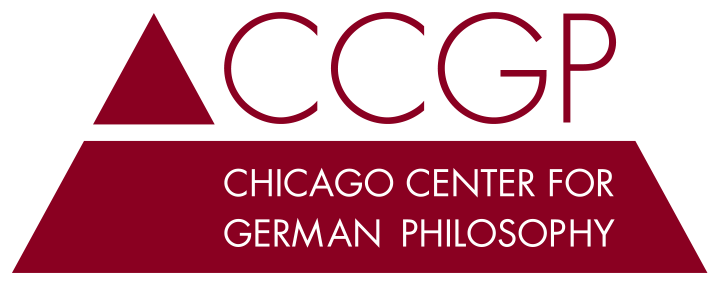
Tel Aviv / Potsdam GIF Cooperative Project
Life and Mind: An Exploration of the Metamorphoses of the Kantian Moment in PhilosophyThe departments of philosophy at the University of Tel-Aviv and the University of Potsdam are engaged in a three-year German-Israel Foundation (GIF) project entitled “Life and Mind: An Exploration of the Metamorphoses of the Kantian Moment in Philosophy”. The primary researchers are Professor Johannes Haag of Potsdam University and Professor Eli Friedlander of Tel Aviv University. While the primary funding is from the GIF grant, additional assistance is provided by the University of Chicago and the FAGI of the University of Leipzig.
The aim of the project is to engage a fundamental configuration in philosophy that we call the Kantian moment. We do not plan to vindicate a strictly Kantian approach to philosophy, but rather to explore an interconnected space opened up or initiated in Kant’s philosophy. Our first guiding assumption is that this configuration constitutes a moment of incomparable richness and force in philosophy. Our second assumption is that the approach and mode of investigation of this subject matter should be systematic rather than merely historical. Our third assumption is that insofar as the Kantian moment is to be understood in its systematic articulation it can inform and transforms contemporary philosophy. In other words, it is a configuration of philosophy that is far from being exhausted and left behind by later developments.
Forthcoming Events
THE FUTURES OF MARX
In cooperation with Centre for Social Critique and Volksbühne am Rosa-Luxemburg-Platz
Volksbühne Berlin
June 28-29, 2023
For a long time, Marx was regarded in academic philosophy no less than in the general discussion as an author of the past, a name without a future. The intensifying crises of global capitalism, the escalating climate crisis, and the postcolonial discussion have brought his critique back into the critical consciousness of the present under changed auspices. At the same time, academic philosophy has rediscovered Marx as a crucial author who has a more open and diverse future than he was previously thought to have. The symposium The Futures of Marx brings together voices from the new international discussion of Marx that seek to tap into these more open futures and that draw from more diverse sources than the previous discussion. Three complexes are at the forefront: a redefinition of the relationship between nature and society in the Anthropocene, a broader critique of the capitalist way of life as a general inability to act, and an understanding of philosophical critique that is not satisfied with merely interpreting the world but wants to participate in its transformation. From Marx, an idea of liberation opens up that does not propagate a liberation of the human being at the expense of nature, but at the same time is supposed to be the “true resurrection of nature” itself. His critique does not aim, as the cliché would have it, at the demise of the individual in plan and collective, but at the rediscovery of our acting with, through and for others. And his “true critique” does not cling to immaterial ideals, as dogmatic critique does, but wants to become real. If we follow this new other Marx, the future must be materialistic, naturalistic and critical in a new way.
Past Events
Analytic Kantianism
Conference organized jointly by Jim Conant (Leipzig), Eli Friedlander (Tel-Aviv), and Johannes Haag (Potsdam)
University of Leipzig
July 8-10, 2019
This conference will be devoted to the study of episodes in twentieth-century analytic philosophy in which major figures in the analytic tradition build on aspects of Kant’s critical philosophy. It will focus on how certain Kantian views are inherited, articulated and transformed in the writings of certain analytic philosophers, as well as on how certain central texts by such figures may serve to further our understanding of the Kantian philosophical project. It will be concerned with both what the central aspirations of Kant’s theoretical philosophy were, as well as with what they should be, according to analytic Kantians, past and present. Hence the aims of the conference will be in equal parts historical and systematic: inquiring into how these figures sought, as well as how we may still seek, to use Kant to illuminate the direction in which one central current of the analytic tradition has been – and still is – traveling.
Limiting Concepts in Kant and German Idealism
Conference organized jointly by Jim Conant (Leipzig), Eli Friedlander (Tel-Aviv), and Johannes Haag (Potsdam)
University of Potsdam
July 1-2, 2019
In his critical philosophy Kant makes ample use of limiting concepts. What is the methodological function of these concepts? Are they functioning as “mere negations which affect a quantity so far as it is not absolutely complete” (Schranke) or do they “presuppose a space existing outside of a certain definite place and enclosing it” (Grenze; Prol. §57 [4:352])? Many of Kant’s limiting concepts were taken up and transformed in German Idealism. The aim of this conference is to examine the many ways in which the themes of limiting concepts and concepts of limitation were addressed by Kant and the German Idealism tradition. Contributors will consider how these philosophers took up issues such as limit, boundary, limitation, finitude, end in their own thinking and used them in the various fields of philosophy.
Kant, Neo-Kantianism, and Jewish Thought
Conference organized jointly by Jim Conant (Leipzig), Eli Friedlander (Tel-Aviv), and Johannes Haag (Potsdam)
University of Tel-Aviv
December 17–20, 2018
This conference will bring together scholars with research foci in any two of the following three areas:
1. The interpretation of Kant, and in particular the unity of Kant’s critical philosophy.
2. The reception of Kantian thought starting with Fichte and Hegel through German Neo-Kantianism, and including its forms of inheritance in Austro-German and Anglophone Analytic Philosophy.
3. The German-Jewish tradition of thought, starting with Mendelssohn and Maimon, through Cohen and Rozenweig, to the present.
The conference is funded by the German Israeli Fund (GIF), the University of Chicago Center for German Philosophy, the Humboldt Foundation, and the FAGI.
Kant’s Religion Within the Limits of Reason Alone
Conference organized by Jim Conant (Leipzig), Gilad Nir (Leipzig), Eli Friedlander (Tel-Aviv), and Johannes Haag (Potsdam)
University of Leipzig
June 22-24, 2018
This conference will explore the importance of Kant’s Religion within the Limits of Reason Alone for an understanding of (1) local interpretive difficulties that arise within each of Kant’s three critiques, (2) the critical philosophy as a whole, and (3) the German-Idealist reception of Kant’s philosophy.
The conference is funded by the German Israeli Fund (GIF), the University of Chicago Center for German Philosophy, the Humboldt Foundation, and the FAGI.
Goethe and Philosophy
Workshop & conference organized by Johannes Haag (Potsdam), Jim Conant (Leipzig), and Eli Friedlander (Tel-Aviv)
University of Tel Aviv
December 17–21, 2017
In this week-long event, we will explore the philosophical sources of Goethe’s thought on nature and art and its influence on philosophy, science, and literature in the nineteenth and twentieth centuries.
The first two days (December 17 and 18), will be conducted in a workshop format. We will read from Goethe’s scientific writings and discuss his concept of scientific method, as well as central notions that serve him to articulate his understanding of nature (such as ‘Intuitive Understanding’, ‘Primal Phenomenon’, ‘Metamorphosis’, ‘Polarity’, and others).
The next three days of the conference (December 19 to 21), will be devoted to the presentation and discussion of pre-circulated papers by some of the participants. The contributions explore the relation between Goethe’s thought and that of his contemporaries, Kant, Schiller, and Hegel, as well as ways in which he is present in the works of twentieth-century figures such as Lukacs, Benjamin, Lipp, Portmann, Cassirer, Wittgenstein, Hadot, and Blumenberg.
Hylomorphism in Kant and German Idealism
Workshop organized by Jim Conant (Leipzig), Eli Friedlander (Tel-Aviv), Johannes Haag (Potsdam), and David Wellbery
Berlin
June 15–16, 2017
The distinction between form and matter plays a crucial role in the philosophies of the German Idealists, as well as in the aesthetic and natural-scientific writings of their contemporaries, such as Goethe and Lessing. Kant himself observes at one point in the First Critique: “Matter and Form. These are two concepts which lie at the basis of all other reflection, so very inseparably are they bound up with the use of the understanding. (A 266/B 322).” Yet the centrality of this distinction not only for Kant’s philosophy but for this entire tradition of thought has often been overlooked in the secondary literature. This conference will be concerned to explore the following three questions (1) how does Kant deploy this distinction? (2) how do his philosophical contemporaries and inheritors employ this distinction? (3) and does a proper appreciation of the answer to each of these questions enable one to better answer the other? We will pay special attention to the deployment of this distinction in aesthetics, epistemology, metaphysics, morphology, and the philosophy of logic.
Logic, Art, and Life: The Kantian Moment and its Aftermath
Workshop organized by Eli Friedlander (Tel-Aviv) and Johannes Haag (Potsdam)
University of Tel Aviv
January 3–5, 2017
Our aim is to engage a fundamental configuration in philosophy that we call the Kantian moment. We do not plan to vindicate a strictly Kantian approach to philosophy, but rather to explore an interconnected space opened up or initiated in Kant’s philosophy. Our first guiding assumption is that this configuration constitutes a moment of incomparable richness and force in philosophy. Our second assumption is that the approach and mode of investigation of this subject matter should be systematic rather than merely historical. Our third assumption is that insofar as the Kantian moment is to be understood in its systematic articulation it can inform and transforms contemporary philosophy. In other words, it is a configuration of philosophy that is far from being exhausted and left behind by later developments.
The richness and complexity of the Kantian moment requires us to focus our project on a guiding theme through which the broad range of issues can be refracted. This theme is the relation of life and mind. The choice of this focus means that the Kantian problematic is approached by a concentration on the perspective opened most explicitly by the Critique of the Power of Judgment. We take this work not only to present Kant’s views on aesthetics or on the character of organic life, but also to afford a broader sustained reflection on the living mindfulness and on the interconnections of human subjects in a field of purposive experience of the world.
Assessing the possibility of a critical idealism in contemporary philosophy is of the utmost importance in addressing the rise of the role of science in the attempts to understand thinking life. It opens the option of a naturalism that is not necessarily simply identified with the results of science, but which would provide a measure to assess the place of empirical investigation in the understanding of human mindedness within a more comprehensive view of nature. Our investigation of the legacy of the Third Critique has further implications for the approach to the problems of culture, history, and society and would constitute an original engagement with, and contribution to, contemporary analytic attempts to reconceive the domain of both the theoretical and the practical in ways that are more open to Aristotelian and Hegelian insights.










